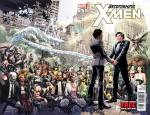Marvel Comics has seen an increase in mainstream popularity with the recent release of several box-office hits such as “The Avengers.” Since its inception in 1939, the comic book company has created thousands of characters. While not all of them may get their due publicity because of a lack of exposure on the silver screen, each has interesting stories to tell in the print medium.
Flipping the pages of a comic book opens a gateway to a fantasy world where the most common narratives depict superheroes making a difference in the community they serve.
What’s rare is when the on-page exploits of these costumed characters become influential enough to fight for a positive change for a community in the real world – no matter how heteronormative that world may be.
Northstar, Marvel’s first openly gay character, isn’t the first gay character to appear on the pages of a comic book. Where Northstar, also known as Jean-Paul Beaubier, does break ground, is that the portrayal of his sexuality was done tastefully, unlike predecessors, like DC’s Extraño, who was depicted as a caricature that reinforced gay stereotypes.
Instead, Northstar has been placed in stories that explore realistic social issues that face the gay community and evoke messages advocating for gay rights. Marvel’s decision to introduce its first gay character alongside social commentaries relevant to the gay community, such as AIDS-related stigma, discrimination and gay marriage, differentiates the Canadian superhero’s sexual identity far beyond just a push for increased diversity.
In 1989, the Comics Code Authority reversed vague policies that would only implicitly preclude supposedly LGBT-related themes from appearing in comic books, such as that “The treatment of love-romance stories shall emphasize the value of home and the sanctity of marriage” or “Sex perversion or any inference to same is strictly forbidden.” Three years later, Marvel would run a story where Beaubier comes out to the public in a fictional newspaper layout that ends “Alpha Flight” Vol. 1, No. 106.
“It has been said ‘Silence equals Death.’ I no longer wish to be part of the Death that is the AIDS crisis,” Beaubier said in his statement. “It is my fervent wish that the expression of my homosexuality will open the doors to conversations.”
The 1992 issue begins with Northstar rescuing an abandoned baby whom he later adopts and names Joanne. It’s later discovered that Joanne contracted AIDS from her mother, which begins the media’s sympathetic coverage of the Beaubiers’ plight.
Major Mapleleaf, a former Canadian superhero, laments the hypocrisy of the media in casting aside a chance for similar coverage of his own son and other gay individuals with the disease. Major Mapleleaf and Northstar engage in a war of words and fists that ends with Northstar deciding to go public with his sexual identity to become an advocate for the gay community.
“Alpha Flight” Vol. 1, No. 106 showed that amid the drama and action of costumed capers was a space to fight for advocacy for human rights issues – in this case, abolishing stigmas of gays and the disease that was once more commonly referred to as “Gay-Related Immunodeficiency.”
Marvel doesn’t sugarcoat Northstar’s life post-disclosure. In “Uncanny X-Men” No. 392, Beaubier has a gun pulled on him at an autobiography signing with the would-be assailant condemning Beaubier as an “abomination against all things clean and just.” In the same issue, fellow X-Man Paulie Provenzano reveals his homophobia by stating he joined the team to work with his “own kind” – mutants – and not a “limp wristed little mapleleaf.”
Things aren’t perfect for the gay superhero – not even on his wedding day.
That story was released in Vol. 3, No. 51 of “Astonishing X-Men” on June 20, 2012 – during LGBT Pride Month and four days removed from the anniversary of when the Marriage Equality Act passed in the state of New York.
The reactions from the different supporting characters as Beaubier and then-fiance Kyle Jinadu prepare for their wedding in Central Park seem to serve as a microcosm for differing societal opinions regarding the topic of gay marriage. Alpha Flight member Puck talks over a beer about how the wedding feels like a lot to process even though he considers himself a progressive person, to which X-Man Havok responds that he can’t stop wondering how his grandmother would react to the wedding.
A private conversation between Warbird and Northstar reveals how the former can’t “recognize the validity of the ceremony vows” before she leaves despite Beaubier’s appeal for her to stay as a teammate and a friend. Warbird isn’t the only one to boycott the wedding, as Beaubier later remarks to his twin sister Jeanne-Marie that he spots several empty seats around the aisle.
But those absences are contrasted by the collage of superheroes who have come to support the union.
I don’t personally identify as gay, nor do I claim to have a perfect understanding of the ongoing struggles that the LGBT community faces. But reading the stories featuring Northstar gave me an opportunity to learn more about these issues in a narrative form.
I can’t say for sure if the stories with Northstar accurately portray those social issues. But reading the depiction of characters was a thought-provoking process that implored for sensitivity toward the lives of people who identify as gay.
And I don’t think I’m the only reader who feels this way.
Who’s your favorite Marvel superhero not seen on the silver screen? Email Yeo at ayeo@media.ucla.edu.

This article is pretty “late to the party” when it comes to discussions of comics and queer rights. Just what was the point here? Is the DAILY BRUIN just catching on to what has been a media movement for a decade?